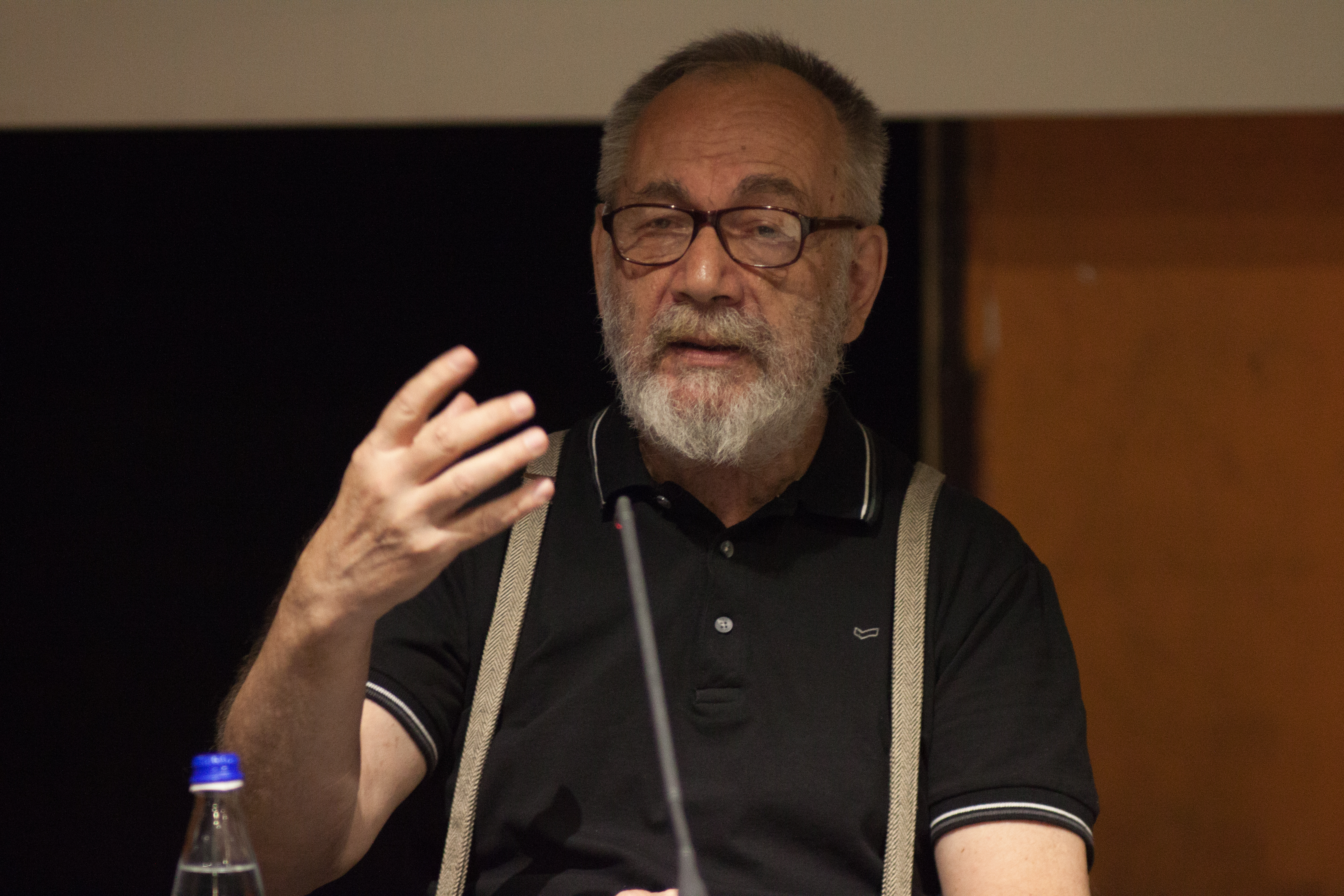
G. M. Tamás at Summer School as School 2019
5 August, 2019, 20:20
Venue: Boxing Club
Summer School as School
5 - 21 August, 2019
5 August, 2019, 20:20
Venue: Boxing Club
Summer School as School
5 - 21 August, 2019
Stacion – Center for Contemporary Art Prishtina is pleased to announce “Was There Fascism in Europe After 1945?” by G. M. Tamás, part of Summer School as School 2019 Public Program.
It is customary to accuse various political and cultural forces for being – allegedly – ‘fascist’. These accusations are usually rejected. Two decades ago, I wrote an essay showing how, after the era of great armed confrontations, some elements of fascism had been preserved or resuscitated in a décor that is parliamentary or even ‘democratic’, under the name of ‘post-fascism’ (Boston Review, Summer 2000).
It is customary to accuse various political and cultural forces for being – allegedly – ‘fascist’. These accusations are usually rejected. Two decades ago, I wrote an essay showing how, after the era of great armed confrontations, some elements of fascism had been preserved or resuscitated in a décor that is parliamentary or even ‘democratic’, under the name of ‘post-fascism’ (Boston Review, Summer 2000).
How serious should we take these terms?
The difficulties are enlightening in themselves. The combination of a denial of the quality of a citizen to the totality or to a part of the political community (usually, consisting of the citizens of a nation-state or a region) by a modern capitalist state, hence a radical divorce between man and citizen, is one of the characteristics of fascism. This has been executed with violence and a ‘totalitarian’ mobilisation of the masses. These latter elements, although not entirely lacking, are now rare.
The difficulties are enlightening in themselves. The combination of a denial of the quality of a citizen to the totality or to a part of the political community (usually, consisting of the citizens of a nation-state or a region) by a modern capitalist state, hence a radical divorce between man and citizen, is one of the characteristics of fascism. This has been executed with violence and a ‘totalitarian’ mobilisation of the masses. These latter elements, although not entirely lacking, are now rare.
What is the difference?
Why is it possible to deny or radically restrict citizenship (political participation and sovereignty affirmed by constitutional law) without a necessary recourse to terror, police state, one-party state, suspension of the autonomy of legal rules and authorities?
The difference is, of course, the absence of a socialist workers’ movement againt which – originally – the fascist counter-revolutions were directed.
Fascism was a device to prevent a socialist revolution in the West. It was a kind of pre-emptive counter-revolution which confiscated political power from the bourgeoisie, too, while on the whole keeping private property (as an institution) intact. It has mobilised the working class and the petty bourgeoisie against the bourgeois liberal state and prevented the coalition of bourgeois Enlightenment and communism. The price for this was a world war and unprecedented human suffering, but Europe is still not socialist – which is the result desired. The main world-historical objective of fascism is attained.
The present crisis needs, but does not get, such a mobilisation, the chief target is lacking, nevertheless the reduction and limitation of democratic citizenship continues. The method is the same as always in the cases of major oppression (confiscation of liberty) in capitalist societies: the transformation of class conflicts and their cognates into ethnic (racial, religious-denominational, ‘cultural’ &c) conflicts.
The present crisis needs, but does not get, such a mobilisation, the chief target is lacking, nevertheless the reduction and limitation of democratic citizenship continues. The method is the same as always in the cases of major oppression (confiscation of liberty) in capitalist societies: the transformation of class conflicts and their cognates into ethnic (racial, religious-denominational, ‘cultural’ &c) conflicts.
G. M. Tamás, a Hungarian philosopher and a prolific writer of essays, was born in Kolozsvár/Cluj (Transylvania, Rumania) in1948. After a brief spell as an associate editor of a Hungarian-language literary weekly, he was blacklisted from publishing and harassed by the secret police of the Ceauşescu régime. Forced to emigrate to Hungary in 1978, he taught for two years at the University of Budapest (ELTE), then he was fired for having published (and signed openly) illegal tracts in samizdat. He had subsequently become a leading figure in the East European dissident movements. From 1986 to the present day, he has held a number of visiting appointments (at Columbia, Oxford, Wilson Center, École des Hautes Études en Sciences Sociales, Chicago, Wissenschaftskolleg zu Berlin, Georgetown, Yale, New School etc.). He was elected to Parliament in 1990 and elected Director of the Institute of Philosophy of the Hungarian Academy of Sciences in 1991. In 1994 and 1995, respectively, he has stepped down from both. Later, he lost his job at the Academy of Sciences (there have been public protests about this) and works as a freelance author. His views on political philosophy and political theory shifted gradually to the left. He is said to belong – with Žižek, Badiou, Kurz, Negri and others – to the company of heretical European Marxists. Professor Tamás’s works (in Hungarian), are numerous: among others, an essay on Descartes (1977), Törzsi fogalmak (Tribal Concepts, collected philosophical papers, 2 vols, 1999), others had been translated into fourteen languages (or written directly in English), e. g., L’Oeil et la main (1985), Les Idoles de la tribu (1989), ‘Telling the Truth about Class’ (Socialist Register 2006), Innocent Power (2012), Postfascism şi anticomunism (2014), ‛Ethnicism After Nationalism’ (Socialist Register 2015), Kommunismus nach 1989 (2015), K filosofii socializmu (2016), Komunizem po letu 1989 (2016) and so on. He has four children and lives – mainly – in Budapest, Hungary. He is in the habit of writing for newspapers and of speaking at demonstrations and left-wing gatherings. At the moment, he is a Visiting Fellow at the Institut für die Wissenschaften vom Menschen in Vienna.